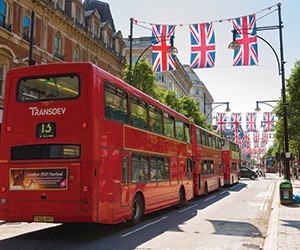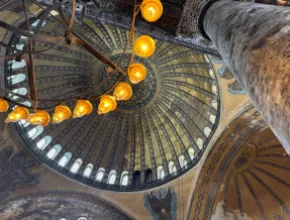From Alfred the Great, born in 849 A.D., to His Royal Highness Prince George of Cambridge, born this summer, the British monarchy continues to define tradition in this proud nation. Invention is another bright coin of the realm, as luminaries from Charles Darwin to The Beatles have made countless contributions to world science, discovery and culture through the centuries. Today, England remains a global leader in areas including life sciences, energy, engineering, finance and the creative arts.
Few brands hold such currency, and as affirmed by London’s success in hosting the 2012 Olympic & Paralympic Games and this summer’s Rolling Stones concert in Hyde Park, England is in top shape and tuned up for major gatherings.
With Liverpool and Manchester among its other primary event destinations, and Brighton and Oxford among its choice secondary markets, business tourism accounts for 28 percent of total overseas visitor spend, generating around $46 billion in overall economic impact.
“Of the 649,000 Americans that visited England on business in 2012, many came for conferences, incentives and other business gatherings,” says Simon Gidman, the London-based head of business visits and events for VisitEngland. “Local and national government are strongly committed to providing effective support networks for overseas event organizers, while our convention bureaus offer fantastic services, including venue location, site visits, hotel booking and delegate welcome.”
With VisitEngland targeting 5 percent annual growth out to 2020 under its current strategic plan, the stage is set for many more crowning moments ahead.
Sterling Showcases
According to the “U.K. Economic Impact Study” commissioned by MPI and published in July, meetings generated some $8.7 billion for London’s economy in 2011, equal to 30 percent of England’s overall meetings trade. The same report finds London leading the U.K. overall, hosting 362,500 meetings that year.
“When the great gets even greater, it’s time to take notice, and that’s what’s just happened to London,” says Chris Lynn, London & Partners’ vice president for business tourism in North America and emerging markets. “The 2012 Olympic & Paralympic Games has inspired an array of new and improved venues to appeal to the most discerning of event planners, with exciting additions sitting side by side with the London showcase of historic and unusual venues.”
The CVB recently negotiated an “Accommodation Charter” for conferences in excess of 1,000 rooms, offering guaranteed rates well in advance.
“This key initiative gives planners great value and peace of mind, coupled with the exciting growth to 117,000 available guest rooms and more announced for the future,” Lynn says. PageBreak
Second behind London for England and fifth overall in the U.K. for meetings is Liverpool. Just two hours by train from London and served by two international airports, Liverpool, with 6,000 hotel rooms in the city and another 4,000 regionally, announced “Confident Conferencing” as its slogan this year. With inestimable cultural heritage, venues like Anfield, home of the legendary Liverpool Football Club, and comprehensive group services, you “will never walk alone” in this iconic port city.
Named “Best U.K. Conference Centre” at the M&IT Industry Awards this year, ACC Liverpool comprises BT Convention Centre and Echo Arena. Located on the city’s World Heritage waterfront, the uniquely versatile facility is the only interlinking arena and convention center complex under one roof in Europe.
“With our new ‘Advantage by ACC Liverpool’ initiative providing comprehensive support to international organizers, we are enhancing our international appeal with the addition of Exhibition Centre Liverpool for large-scale gatherings,” says Kerrin MacPhie, director of sales at ACC Liverpool. Slated for a 2015 opening, the striking new venue will be connected by bridge to the existing facilities.
Innovation, culture and sports are also all hallmarks of Manchester and Birmingham.
“Birthplace of everything from the Industrial Revolution to the computer, Manchester is the original modern city,” says Paul Simpson, managing director of Visit Manchester, the city’s convention bureau.
With direct flights from more than 200 international destinations, the city’s flagship venue, Manchester Central, just completed an extensive upgrade that includes banquet facilities for up to 1,200 delegates. The venue forms part of the Petersfield conference cluster of proximate venues, hotels and cultural spaces. Other choices include EventCity, suitable for large-scale expos, and the Manchester School of Art.
Boasting an acclaimed culinary scene and eclectic off-agenda options for groups, centrally located Birmingham continues to solidify its established group appeal.
“With our visitor numbers at a record high of 33.8 million, Birmingham is on the cusp of significant infrastructure changes,” says Ian Taylor, commercial director at Marketing Birmingham, operator of Meet Birmingham, the city’s official business tourism program. “These include the £600 million redevelopment of New Street station, the runway extension at Birmingham Airport and the newly opened Library of Birmingham, ensuring visitors are provided with the high quality experiences they need to return.”PageBreak
Regional Riches
England’s meetings portfolio also includes a number of appealing regional destinations. First recommended for its “rejuvenative qualities” by a doctor in 1750, the seaside escape of Brighton is the largest conference destination in South East England, offering 10,000 area beds and accommodating up to 4,500 delegates at the Brighton Centre. Just one hour from London by train and only 30 minutes from Gatwick Airport, this festive city’s “quadrophonic” appeal includes dining, shopping, culture and history, featuring meetings gems like the Brighton Dome and the landmark Royal Pavilion pleasure palace.
At the forefront of achievement for centuries, the university towns of Oxford and Cambridge are “academic” choices for groups.
Founded around the 13th century, Oxford, with Sir Walter Raleigh, T.S. Eliot and 26 British Prime Ministers among its alumni, is home to the event-capable Bodleian Library (1602) and the U.K.’s oldest museum, the Ashmolean (1683). Group venues in town include Christ Church and Malmaison, a prison-turned-hotel, while nearby treasures include Blenheim Palace, a World Heritage Site and birthplace of Sir Winston Churchill, and Heythrop Park Resort.
For 804 years, great minds have met at Cambridge, founded in 1209 and boasting equally renowned alumni, from Charles Darwin to Prince Charles. With 36 impressive group venues, including many of Cambridge’s historic colleges and the modern Moller Center, Conference Cambridge is a one-stop shop for planners.
In the heart of North East England, Newcastle and Gateshead, joined by seven bridges across the River Tyne, form a citadel of history 2,000 years in the making. Together, these “twin cities” offer a diverse mix of venues, from the Assembly Rooms (1776) to the modern BALTIC Centre for Contemporary Art.
From Sherwood Forest National Nature Reserve, established as a royal hunting preserve in the 10th century and legendary home of Robin Hood, to the sandstone caves under its streets, historic Nottingham, capital of England’s East Midlands region, is a scenic escape into history.
Longtime Meetings Focus contributor Jeff Heilman lived in England from 1969 to 1981. His favorite British hotel is the Mermaid Inn, founded in 1420 in ancient Rye on the East Sussex coast.







